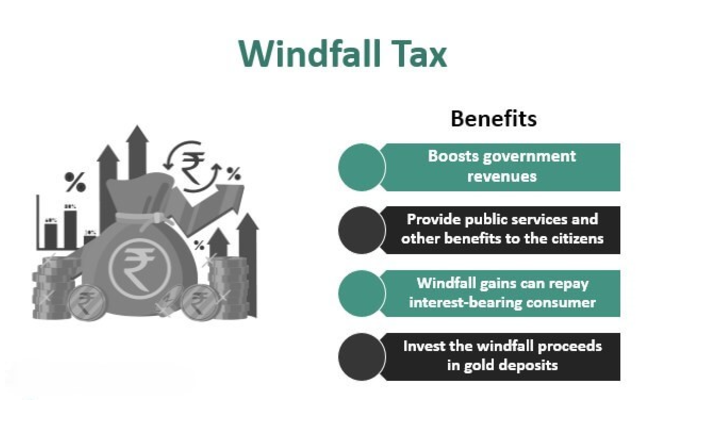Government Scraps Windfall Gains Tax Amid Stabilized Global Oil Prices and Declining Revenues
(Source: Indian Express; Section: Explained; Page: 09)
| Topic: GS3 – Indian Economy |
| Context: |
|
Analysis of News:
What is Windfall Tax?
- A Windfall Tax is a type of tax that is levied on companies or individuals who have unexpectedly and/or dramatically gained large profits, often due to external factors beyond their control.
-
- It is commonly levied on industries such as oil, gas, and mining.
-
- The purpose is to capture a portion of the extraordinary profits that companies make and redistribute it for public good.
-
- It is a strategic measure to promote transparency and fairness and responsible economic practices in the energy industry.

Reasons for Imposition
- Global Price Surge: Crude oil prices exceeded $100 per barrel post-Ukraine invasion, impacting domestic oil prices and incentivizing refiners to export fuels.
- Supply Concerns: Export-driven shortages disrupted domestic fuel supply, necessitating measures to ensure availability.
- Revenue Generation: The tax helped cushion government revenue amid reduced excise duties on petrol and diesel.
Decline in Relevance
- Price Stabilization: Crude oil prices dropped below $75 per barrel, reducing profit margins and the need for the levy.
- Revenue Decline: Collections from the tax fell from ₹25,000 crore in FY23 to ₹6,000 crore in FY25.
- Nil Levies: The tax on petrol, diesel, and ATF exports, as well as domestic crude production, had been progressively reduced to zero by 2024.
Opposition and Industry Concerns
- Profitability Constraints: The tax was criticized for limiting the profitability of oil companies and discouraging production efforts in an import-dependent economy.
- Unpredictable Regime: Frequent revisions created uncertainty, deterring long-term planning and investments.
Impact of Withdrawal
- Industry Reassurance: Scrapping the tax signals a predictable and stable taxation environment, fostering industry confidence.
- Global Alignment: Aligns with stabilized global energy flows and reduced need for intervention.
- Market Dynamics: The move reflects the government’s acknowledgment of changing market realities, emphasizing flexibility in policy responses.
Conclusion
- The withdrawal of the windfall gains tax marks the end of an era shaped by extraordinary global circumstances.
- By responding to evolving market conditions, the government aims to balance domestic energy needs, fiscal stability, and industry growth, signaling adaptability in its policy approach.
| Practice Question: Discuss the rationale behind the imposition of the windfall gains tax in 2022 and analyze the factors that led to its withdrawal in 2024. What implications does this have for India’s oil industry and fiscal policy? (250 words/15 m) |
